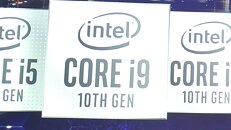Friday, January 10th 2020

Intel's Comet Lake Absence at CES Reportedly Related to Power Consumption Wall
Reports are flooding the web regarding Intel's total lack of reference to their upcoming Comet Lake family of CPUs, which will be branded under the Intel Core 10000 series. As reports would have it, motherboard makers had stock of LGA 1200 motherboards ready to showcase at CES, but were told to pull them in what is equivalent to a logistical "last minute". It seems that both Intel's lack of commitment to Comet Lake on its CES presentation and absence of ecosystem showcase at this year's CES might have something to do with, well, close to shame on Intel's parts.
Comet Lake will increase the maximum core count for their desktop CPUs up to 10 cores and 20 logical threads. But being built on the same 14 nm process as previous Intel generations since Skylake, there isn't much that can be done to offset increased power consumption. This is why industry sources are claiming Intel decided to skip Comet Lake at this CES - a difficulty to rein in the processors' power consumption in time for the event, with power consumption hitting 300 W. And with Intel's Core i9 10900K being configured with a PL2 (Power Level 2) of 250 W, a maximum 300 W under full load seems more than plausible.
Source:
Computerbase.de
Comet Lake will increase the maximum core count for their desktop CPUs up to 10 cores and 20 logical threads. But being built on the same 14 nm process as previous Intel generations since Skylake, there isn't much that can be done to offset increased power consumption. This is why industry sources are claiming Intel decided to skip Comet Lake at this CES - a difficulty to rein in the processors' power consumption in time for the event, with power consumption hitting 300 W. And with Intel's Core i9 10900K being configured with a PL2 (Power Level 2) of 250 W, a maximum 300 W under full load seems more than plausible.

37 Comments on Intel's Comet Lake Absence at CES Reportedly Related to Power Consumption Wall
Of course, you can always adjust the Turbo multipliers and voltage yourself. That's what I did with my 2600k. What was once a 3.8GHz single core Turbo chip is now a 4.4GHz all core Turbo chip (with more room, if I had a better cooler). The disappointment comes when we're used to seeing huge overclocks starting with C2D all the way up to Sandy Bridge. Ivy Bridge was okay, but that's where the disappointment started to set in. Now, with Coffee Lake and above, and its AMD counterparts, there's not much room left to overclock yourself.
So yeah, it's mostly a marketing tool to put big, impressive numbers on the box. To reach those numbers you essentially have to build a system like you would in the old days if you intended to overclock. Decent board, good cooler. That's why the 9900k goes way above 95w... they overclocked the snot out of it, much like the popular i7 920 would draw copious amounts of power when it was pushed. Think of it like horsepower ratings... my Honda Civic is rated at 115 HP... at 6100RPM! :eek: I've never pushed it beyond 4500 or so, even in first gear.
Of course SKUs would change due to this, but the changes would be to the worse - high end chips would be scarce top bins or have high TDPs to ensure sufficient chips meet the clock speed target within TDP. This would also likely lead to a lot more SKUs as the range from best to worst chips would grow, making lineups more messy (and top end chips likely more expensive). And even then you wouldn't come anywhere near modern boost speeds as no cores would clock beyond the highest all-core speed within TDP regardless of power or thermal headroom.
Of course this would make for improved overclocking (simply because the entire point of boosting is to leave less performance on the table) but it would still be a significant net loss to the vast majority of users. Let's please abandon this foolish nostalgia back to when our PC components were dumber, less dynamic and overall much more poorly managed than today.
Finally, to wrap up my argument, I'm not trying to say that Turbo, in itself, is bad. I'm just saying it's badly advertised. To me personally, it makes about as much sense as a commercial that might advertise the newest Mustang, going nice and fast with impressive handling around sharp curves or other potentially hazardous conditions... with the disclaimer professional driver on a closed course etc etc... it doesn't take into account that a normal person can't actually drive their car like that unless they are also a skilled driver on a closed course. Otherwise, you'll probably crash into something, or you'll run into other trouble when you are running from the police. Or you'll just pull over right away and get a nice fine, or worse.
Shoot me. I'm done.
Now what really made things worse the past few gens was that mobo manufacturers figured it was a good idea to put oil spills all over the race course to make things go even faster, never mind the fact even a professional driver would then quickly lose control :D
I love car analogies
I wonder if there's a Supernova or Inferno Lake in there somewhere!